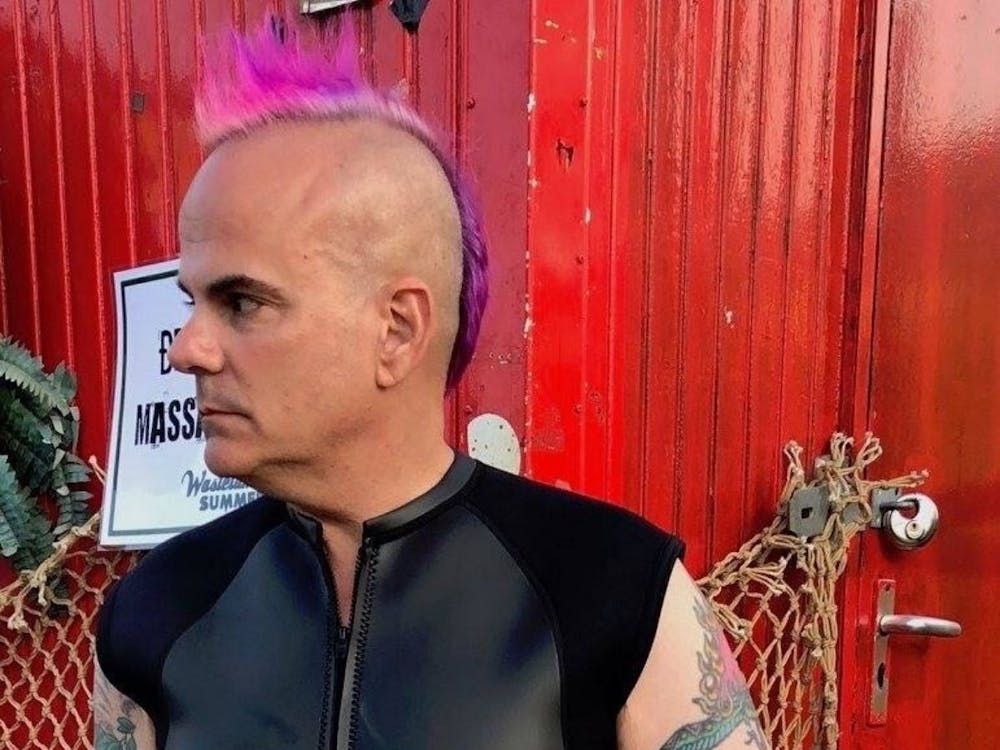Everything about Pete Sigal is as you’d expect for a Duke professor. That is, besides his bright purple mohawk and eagerness to talk about sex.
This spring, Sigal, a professor in the department of history, will induct 80 more students into his boundary-pushing academic experiment: Sexual Pleasure in the Modern World. With this course, Sigal brings sex into the classroom environment by unraveling its ties to colonialism and slavery. In doing so, he hopes to challenge the ways Duke students think about their own sexuality and pleasure.
"Maybe it will be interesting. Maybe it will be really weird, maybe it will be awkward. I don't know," said junior Tyler Long, recounting his thoughts prior to the first class.
Shortly after settling into his auditorium seat, Long recalls Sigal taking center stage. Without a word, he dimmed the lights and played the music video for "Justify My Love" by Madonna. For those who aren't too familiar with 90’s pop music videos, Long explains, "it's like Madonna in a sex house, basically.”
Sigal then guided his students through a variety of sexually provocative images: people practicing BDSM, Rihanna’s “S&M” music video, Kim Kardashian's Paper Magazine cover, sexually exploitative advertisements of black men, various kinks and fetishes, whips, latex and nudity.
Around Long, students squirmed and laughed uncomfortably, glancing away from the screen, nudging their friends for relief. Most students come to expect a long-winded syllabus overview for their first class period. But a slideshow of a man with a bull-whip in his butt? Not so much.
Through these images, however, Sigal set the semester’s tone far more successfully than any syllabus could. The photos hint at the role that sex plays in violence and pleasure and how sex has been used to wield and take away power. They show how sex has been weaponized to fetishize black bodies, dehumanize indigenous people and marginalize queer identities.
“I am trying to get them to react in a particular way and then to expand on that reaction to think, ‘okay, well, why did I react this way to this thing and a different way to Rihanna and yet another way to these other images?’” Sigal said. He wants his students to see for themselves that “their reactions to [sexual imagery] are historically conditioned.”
The founding conviction of his research and class is that our modern connotations of sex and sexual pleasure can be directly traced back to 15th and 16th century colonialism. By understanding colonial notions of sexuality over time, we can contextualize the role that sexual pleasure and sexual violence plays in our own lives and culture.
On the second day of class, Sigal discussed how the British and Dutch colonization of Africans impact modern sexual stereotypes. He explained that these colonial sexual models “transfer onto us today in ways in which we, say, think about black men.” By tracing the lineage of colonization in Africa and then the United States, he argues, we can make sense of the violence embedded in modern sexual tropes of black men.
“My goal for the course is to think about that violence, to mitigate that violence in certain ways, and at the same time to expand our notion of sexual pleasure, to think about this kind of interaction—that our notions of sexual pleasure are based on this model of violence,” Sigal said. “So how do we recognize the violence and expand our own pleasures?”
The class also stands as a celebration of sexual diversity and expression.
For senior Luis Antillon and junior Tess Johnson, students in the class just two years ago, the class continues to have a measured impact on their lives.
For Antillon, the class was an invaluable opportunity to explore personal and societal sexual preferences and the ways these preferences are tied to racist, sexist and heterosexist histories.
“I think it helps people kind of define for themselves what sex is and what what is sexy,” he continued. “It makes you think about why certain sexual tropes and certain sexual stereotypes can be problematic, without us even realizing it.”
Johnson championed the radical openness of the class, which empowered her to reject the shame and guilt surrounding conversations about sex.
“I think we go around sex education the completely wrong way,” she said. “I think having a course like the sexual pleasure course where it's openly talked about, where you can talk about sex in a healthy way and try to get rid of the shame that's kind of been nailed into way too many people in society is—I think—a really powerful thing."
Get The Chronicle straight to your inbox
Signup for our weekly newsletter. Cancel at any time.

